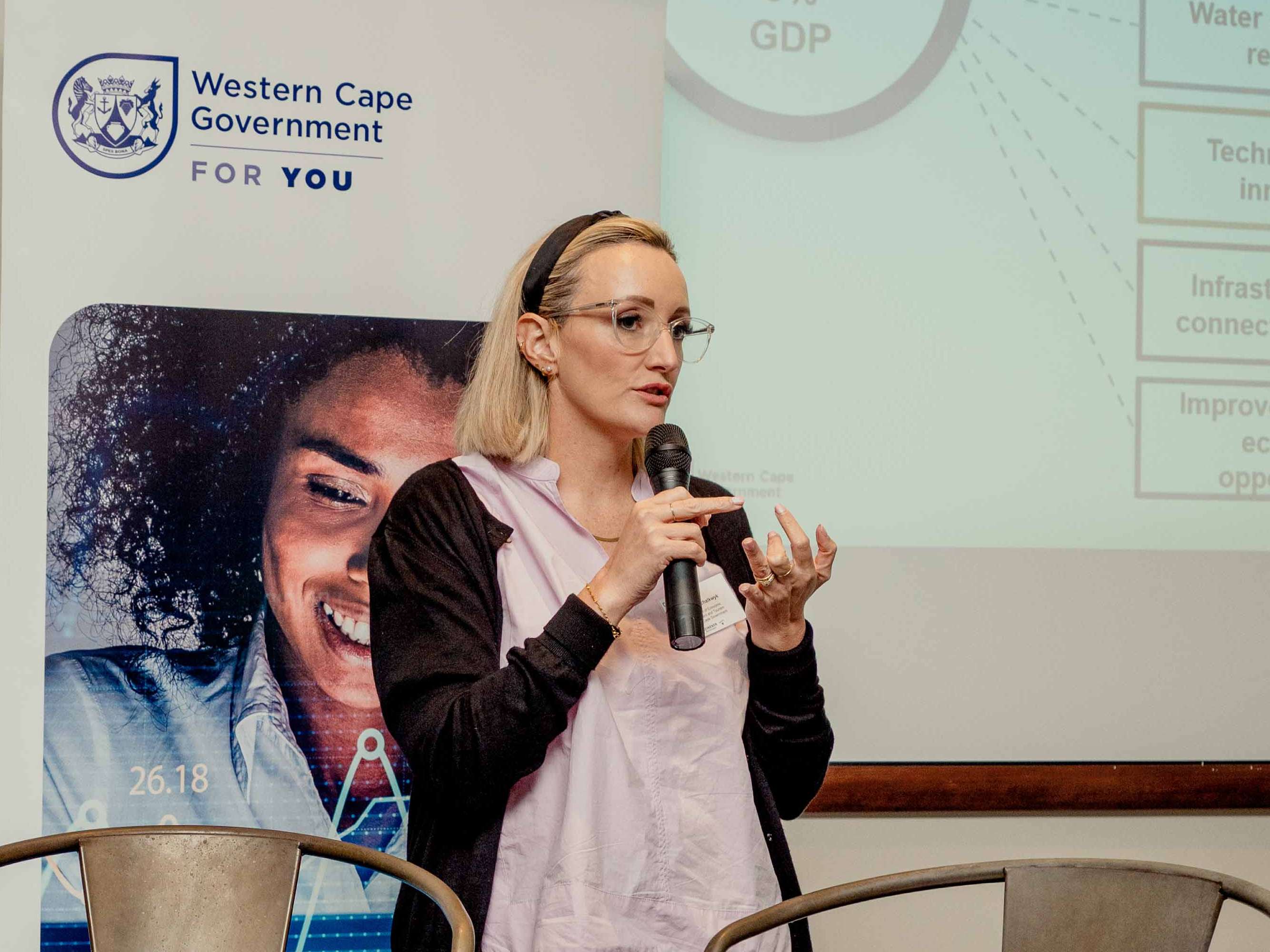Join us to shape a better future, contact Secretariats:
Narieman Solomon Tariro Chivige

Global Competitiveness Index: 4.0
Pillar 1: Institutions 8.3%
D. Public-sector performance 12.5%
1.10 Burden of government regulation
1.11 Efficiency of legal framework in settling disputes
1.12 E-Participation
E. Transparency 12.5%
1.13 Incidence of corruption
F. Property rights 12.5%
1.14 Property rights
1.15 Intellectual property protection
1.16 Quality of land administration
The Chamber contributes to the strengthening of the business environment by:
1. Supporting regional sector and value chain development programmes - for firms to express their concerns about issues affecting business in their sub-sector and to steer systematic improvement to realise faster growth of the sub-sector.
2. Supporting Business retention and expansion programmes - to steer systematic improvement of their local business environment.
3. Facilitating dialogue with the public sector - towards more effective public investment, smarter service delivery, procurement efficacy and to stop doing what the private sector can do with greater efficacy.
4. Creating large-scale awareness of issues concerning business, which needs to be rectified by the public sector or other responsible parties. Various platforms are utilised including events with key stakeholders, traditional media and social media.
SYSTEMIC REFORM
A dynamic society requires dynamic and agile leadership. Likewise, the evolving business environment requires stewardship from those able to adapt to new technology, new ideas, and ever-changing circumstances.
South Africans are used to seismic changes in policy, courtesy of our turbulent past. However, the shifting political imperatives need to be balanced against the need for policy stability – a key ingredient of business success.
The Chamber plays an active role in addressing policy weaknesses and outdated legislation in need of reform. In some cases, this involves navigating the awkward interface between different tiers of government. By way of example, national procurement policy is an area that requires urgent attention because of its ability to impact all economic sectors. One of the Chamber’s roles is to identify key areas in need of systemic reform and to track change – or the lack thereof.
Some policy areas require clarity, such as economic empowerment or energy procurement, while others are outdated and /or obsolete. Inadequate policy and/or legislation also carries the risk of costly and lengthy legal delays from those adversely affected.
The Western Cape is the epicentre of the country’s commercial fishing industry. The newly promulgated small-scale fishing policy is another example of a convoluted policy framework that has triggered concern, due largely to claims that in its current form it may be impractical. There is also a disconnect between policy and reality – where commercial fishing rights may contradict policies that outlaw paper quota holders. In cases like this, the Chamber serves as a watchdog to ensure government policy is both logical and practical.
Even an effective policy will fail if it cannot be enforced.
RED TAPE REDUCTION
Capital expenditure is regularly retarded by red tape that constricts government’s ability to function. This is evident at all government levels despite regular promises of renewal from the highest level. From the President down to district mayors, the call to reduce cumbersome bureaucracy is a rallying cry that too often appears to fall on deaf ears.
There are, however success stories, particularly here in the Western Cape where the province’s Red Tape Reduction Unit has resolved some blockages.
The Western Cape defines red tape as:
- Non-essential procedures, forms, licenses, and regulations that add to the cost of dealing with government, or
- Anything obsolete, redundant, wasteful or confusing that diminishes the competitiveness of the Province, which stands in the way of economic growth and job creation or wastes taxpayers’ time and money.
The Province says red tape interferes with:
- The ability of business to compete in a global marketplace as a result of unnecessary costs and or delays;
- The rate of establishment of new businesses; and
- The sustainability and/or growth of existing enterprises.
The Chamber’s role in this instance is to ensure that this worthy policy translates into positive results, such as the case of Atlantis boat builder Phoenix Marine, which couldn’t obtain a permit required to relocate a R12,5-million yacht to a US boat show. The Province’s Red Tape Reduction Unit helped secure the permit with only a few days left before the show, resulting in a South African showcase in a key export market.
The Chamber also engages relevant media in order to draw attention to the worst instances of red tape where this may be in the public interest.
SPATIAL DEVELOPMENT AND LAND USE
Human population growth presents multiple challenges to government authorities, particularly around the expansion of the urban environment. Business needs room to grow in the same way that residential areas invariably expand to accommodate the growing population. This requires government to constantly update its spatial development frameworks and land use regulations.
Inconsistent land-use decisions can result in protracted legal disputes and contestation. It can also affect institutional credibility, particularly when unnecessary zoning updates impact negatively on business growth.
The property development and building sector have a particular interest in spatial development and land use planning at local government level. It is another area of public service requiring careful monitoring and performance appraisal.
Staff shortages and skills deficits within government authorities can delay approval processes for new-build projects. A recent example of a mega-project embroiled in spatial development issues is the multi-billion rand River Club Development in Observatory, Cape Town.
Rural land-use planning and management are equally important. Agriculture, a key Western Cape economic sector, requires fertile land and land-use security. However, agricultural land is increasingly under pressure as metropoles expand. Semigration from Gauteng has placed an additional burden on Western Cape municipalities with the rise of dormitory suburbs slowly eroding the rural periphery. The Cape Winelands is another area requiring a tricky balancing act between the demands of agriculture and property development.
The Western Cape is also blessed with an extraordinary natural heritage and is home to multiple World Heritage Areas, among them the Cape Floristic Kingdom. The need to conserve, protect and in some cases expand these natural areas in line with our international heritage commitments adds an additional layer of complexity to spatial development considerations. It also adds an additional dimension to the Chamber’s role of a public service performance monitor.








